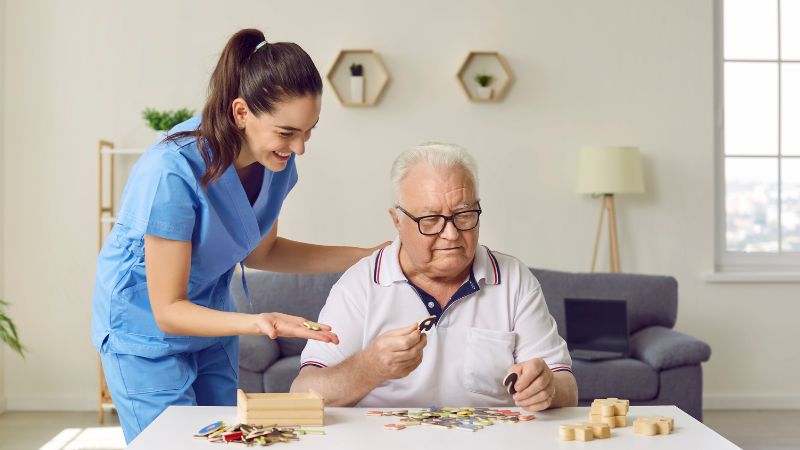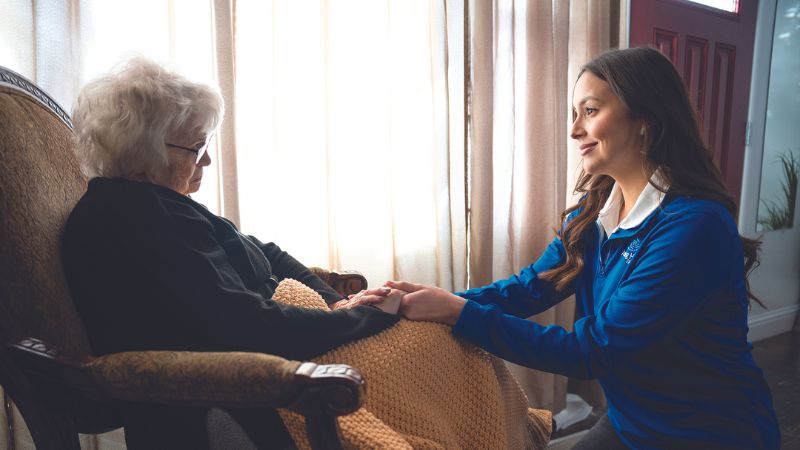
Mental health problems are common in the elderly population. Seniors who experience cognitive decline, social isolation, or physical health issues can develop mental illness. Home Caregivers can use these tips to help older adults who are struggling with their mental health.
How prevalent are mental health issues?
The statistics surrounding mental health problems in the elderly are alarming. Approximately 15 percent of people aged 60 and older live with mental health issues. Even more concerning is that 63 percent of seniors with mental illness do not receive the support they need to recover.
Why do seniors struggle with mental health?
Older people may develop mental illness due to a number of causes. Elder abuse can contribute to mental problems, and one out of every six seniors undergoes abuse. Furthermore, most primary care physicians neglect to diagnose depression in their elderly patients.
A lack of social engagement is another harbinger to mental illness in the elderly. About 12 percent of seniors report they fail to receive social support. Grief and widowhood also contribute to the social isolation and feelings of loneliness that can lead to bouts of depression.
Additional triggers of mental illness in seniors include medication side effects, malnutrition, and dementia. Older adults who become immobile may begin to experience symptoms of mental illness, too. Similarly, chronic pain and other physical ailments can produce mental issues in the elderly.
What is the most common mental illness in the elderly?
Depression
The most common mental illness to affect older adults is depression. About five percent of seniors around the world live with depression. While depression is normal after the loss of a loved one, symptoms that linger more than two weeks are signs of a mental health issue.
Symptoms of depression include feelings of hopelessness, guilt, or sadness. A depressed senior is fatigued easily and experiences pain that has no clear cause. The individual is likely to either sleep excessively or have difficulty sleeping. Restless and irritability accompany depression.
Anxiety
The second-most common mental illness among seniors is anxiety. The older person may be affected by social anxiety disorder, where they feel self-conscious in social situations. Persistent worry is characteristic of generalized anxiety disorder. Obsessive-compulsive disorder causes intrusive thoughts, which the anxious senior attempts to soothe with repetitive actions.
Substance Abuse
Substance abuse disorder is another mental illness that affects one million seniors. The risk for drug abuse is high among the elderly, considering they are prescribed multiple medications, including pain medications. Binge drinking affects about 65 percent of older adults.
Post-Traumatic Stress Disorder
PTSD can develop in older adults who have experienced traumatic events earlier in life or during old age. Symptoms may include intrusive memories, flashbacks, hypervigilance, avoidance of triggers, and emotional numbing.
Dementia
Dementia, including Alzheimer’s disease, is a progressive neurocognitive disorder that primarily affects older adults. It impairs memory, cognitive function, and behavior, leading to difficulties in daily functioning and social interaction. A 24-hour dementia care is required for these patients.
Signs of Mental Illness Among Seniors: Pay Attention to Them
If you’re an in-house caregiver, notice the below symptoms that typically suggest that the senior is definitely going through a mental breakdown.
- Pessimistic thoughts
- Continuous headaches
- Feeling more stressed or worried than usual.
- Experiencing disruptions in daily life due to thoughts or behaviors.
- Showing more anger, irritability, or aggression.
- Having trouble concentrating, or feeling more anxious.
- Engaging in risky behaviors that are out of character.
- Difficult sleeping or sleeping too much than usual.
- Always sad.
- Thoughts of suicide and deaths.
5 Basic emotional needs of the elderly?
The emotional well-being of seniors involves several key aspects that are vital for their happiness and fulfillment:
- Validation and Respect: Seniors want to feel appreciated and respected for their life experiences and contributions. Recognizing their wisdom and acknowledging their opinions helps them feel valued and esteemed.
- Emotional Support: Seniors go through various challenges, so having someone to talk to and lean on is important. Whether it’s dealing with health issues or adjusting to changes, having emotional support can make a big difference in their well-being.
- Autonomy and Independence: Seniors cherish their independence and autonomy. While they may need help with certain tasks, it’s essential to respect their ability to make decisions and maintain control over their lives.
- Security and Safety: Feeling safe and secure is essential for seniors’ peace of mind. Whether it’s physical safety in their environment or feeling emotionally secure in their relationships, it’s crucial for their overall well-being.
- Purpose and Meaning: Seniors find fulfillment in activities that give them a sense of purpose. Whether it’s pursuing hobbies, volunteering, or spending time with loved ones, having a sense of meaning in their lives brings them happiness and satisfaction.
8 Proven Methods to Improve Mental Health in Seniors

Mental illness affects people on not only an emotional level but a physical and cognitive level. Older adults require steady emotional support—when this essential human need is unmet, their mental well-being is adversely affected and mental health becomes tough to manage.
- Social Opportunities: The psychological health of seniors is sustained whey they enjoy robust personal connections. The companionship of family, friends, and other older adults reduces their likelihood of developing loneliness and depression. Seniors experience emotional stability when they stay connected with others. Similarly, interacting with their beloved community can lead to feelings of emotional well-being. Caregivers who provide reliable transportation ensure their elderly loved ones participate in meaningful social activities, such as nearby faith services, senior center activities, or local senior-friendly events.
- Mental Stimulation: A stimulated brain is a healthier brain, especially as seniors age. Mental stimulation decreases the risk for cognitive decline as well as susceptibility to mental health issues, like depression. Caregivers are advised to encourage their aging loved one to explore new ways to learn. For example, caregivers can provide elderly care recipients with craft supplies so they can resume a hobby. Caregivers can read to seniors or play word games with them. Flipping through family photo albums is not only stimulating but inspires joyful feelings. Conversing is equally effective.
- Safety: Seniors who feel safe, both physically and emotionally, thrive. Physical safety can be achieved by eliminating clutter and reducing fall risks in the home. Provide the senior with a medical alert system, which helps minimize their fears. Also modify the home so that it’s senior friendly.
- Mindfulness Practice: Caregivers should introduce seniors to mindfulness techniques like meditation, deep breathing exercises, or gentle stretching can significantly enhance their mental well-being. These practices promote relaxation, reduce stress levels, and cultivate a greater sense of inner peace and contentment. Regular mindfulness practice can also improve cognitive function and help seniors better manage symptoms of anxiety or depression.
- Exercise: Exercise not only benefits their physical well-being but also has profound effects on mood and cognition. Activities like walking, swimming, or tai chi can boost mood, reduce symptoms of depression and anxiety, and enhance overall cognitive function. Additionally, exercise promotes better sleep quality, which is essential for mental health.
- Caring for a Pet: The companionship of a pet can have profound effects on seniors’ mental health and overall quality of life. Caring for a pet provides companionship, reduces feelings of loneliness and isolation, and fosters a sense of purpose and responsibility. The unconditional love and support of a pet can also alleviate stress, elevate mood, and promote a sense of well-being. Whether it’s a dog, cat, or smaller pet like a bird or fish, the bond between seniors and their pets can bring immense joy and fulfillment.
- Treating Mental Health Conditions: A professional help from a therapist, counselor, or psychiatrist is essential if they are experiencing symptoms of mental illness. Treatment options may include therapy, medication, or a combination of both, tailored to the individual’s specific needs and circumstances. Providing ongoing support and encouragement throughout the treatment process is key to ensuring seniors receive the care they need to improve their mental health and overall quality of life.
- Support Health Behaviors: Caregiver should encourage seniors to adopt and maintain healthy lifestyle habits for promoting good mental health. This includes eating a nutritious diet rich in fruits, vegetables, whole grains, and lean proteins, which provides essential nutrients for brain health and overall well-being. Staying hydrated, limiting alcohol consumption, and avoiding smoking are also important for maintaining optimal mental health.
Assisting Hands for Companion Care Needs

Promote emotional security by ensuring a caregiver is available to listen to the senior and encourage them to be their emotional best. If a family member is unavailable, a professional home caregiver can provide the emotional support older adults need to live independently and confidently at home.
Caregivers from Assisting Hands Home Care are pivotal in improving the mental health of seniors. As a part of our home care services, our professionals keep seniors’ minds engaged with games, puzzles, and conversations. We schedule exercise, such as yoga or walking, into their days to keep them fit and healthy.
We also offer physical support, such as during walks or through the home, to give our valued care recipients extra confidence. Our caregivers are trained to provide safe transfer assistance to help seniors get into or out of a bed, wheelchair, or chair. These supports reduce seniors’ fears.
Companion caregivers encourage hobbies, thereby helping seniors feel engaged, comfortable, and an important sense of belonging. We provide safe transportation to areas in the community, including medical facilities and senior centers, so the elderly stay connected to the people and places they value.
Senior companionship is vital to the overall health of the elderly. Our home care agency goes a step further and offers additional care services to elevate seniors’ quality of life. We assist with hygiene tasks, shop for fresh groceries, provide medication reminders, and perform light housekeeping.
Caregivers prepare healthy meals and join seniors at the table; our social companionship encourages the elderly to eat more and maintain a healthy weight. Our pleasant conversations reduce the loneliness and isolation that can lead to the risk for depression and cognitive decline.
Incorporate Assisting Hands Home Care into your aging loved one’s care plan. Our compassionate care services complement aging in place and give seniors a better quality of life. Schedule your free in-home consult at our Palos Heights, Illinois, location and help enhance their mental health.















